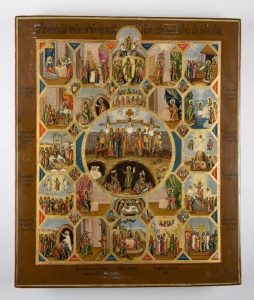Fr Seraphim Rose+ on Lessons from the Past…
By reading and getting a historical perspective, we see that in past ages this was not considered enough, even by ordinary laymen. They were constantly doing things out of the ordinary. They were getting up very early in the morning. Every village had daily services. At four or five o’clock in the morning, Matins would begin. The people woke up and they went to church every morning, and again to Vespers in the evening. We take many, many Lives of Saints, and we read how they heard the church bell when they were children. If the child was very zealous for God, he would be the first one up in the morning and he would wake the parents up and get them ready for church. If the father could not go because he had to work in the fields, the child would get the mother up and they would go to church. Sometimes he went by himself. The whole atmosphere was penetrated with churchliness. And now, we see worldliness. Very seldom can one find a place where even daily services are celebrated in the world. People have grown unaccustomed to the idea that there is supposed to be an everyday church, everyday church services.
This, then, is one of the very great things which we see in front of us: this worldly attitude of people who are themselves in the Church. We must look at it realistically and see it the way it is: apostasy, error, evil, demonic activity and worldliness such as never before in the history of the world. These things are all anti-spiritual, anti-Orthodox. They lead down; and if anyone follows these paths, they do not lead one to salvation.
Then, once having done this—that is, having looked at things the way they are and been realistic about them—one must learn to fight on the right battlefields. The whole spiritual life is struggle. One must learn to know where one must fight, what one must do. This is extremely important, because it is very easy in the beginning stage to go totally off, by picking up and reading a book that talks about spirituality, hesychasm, and so on.
– Homily ‘In Step with St Patrick’
